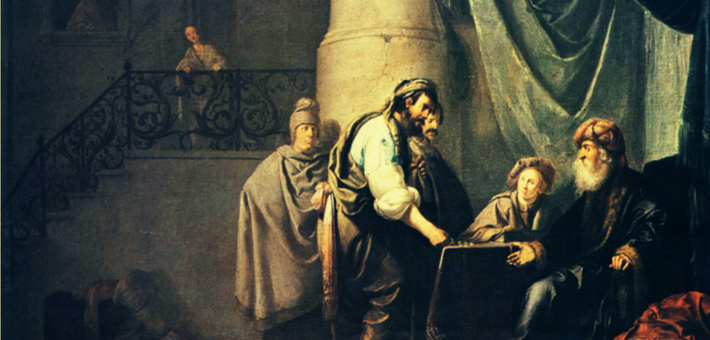Commentary on Mark 12:1-12 [13-17]
This text is among those in the Bible that are difficult, complex, and our reading depends on where and with whom we are committed to understand it. Angela Dienhart Hancock raises very important issues with this text, and her reflection is worth reading.1
The interpretation of this text has included strange allegorical readings that use the text to say something else. For example, what has been common in this interpretation is a horrendous theological Christian supersessionist lens where God is the landowner and the tenants are Israel who does not recognize Jesus as the tenant’s son and kills him. That means that Israel didn’t get God’s message, but Jesus and the Christians did.
When Jesus tells this story, he has just arrived in Jerusalem and is now feeling the proximity of his death. It seems that Jesus says here all that he wants to say to the people and authorities, and then later decides to be silent when he is in the hands of the authorities he had just defied.
So I will offer my own ways of seeing this text, hoping that it might spark some questions for the preacher. For me, it is impossible to engage this text without being deeply involved in the struggle of the land. Landowners, slaves, and tenants form a very unequal ring of relations. For example, if you understand landowners as having the right to own a piece of the land and have others working for them, you will be on the side of the landowner in this story and will despise the evil things the tenants do. However, if you take the side of the tenants, you will be more prone to see all the violence of the landowner.
Thus, if we start from the reality of latifundia,2 a process of owning land by stealing or taking it away from others and making it one’s own, we will see the very beginning of injustice and inequality being settled into our forms of living, just as this parable talks about. David Castillo Mora says about this process in Palestine:
Many of the inhabitants of Galilee and other areas of Palestine were tenants who had lost their land or inherited family debts due to economic pressure from the Temple, the Herodian monarchy, and the Roman Empire, and they rented land to landowners such as the one in the parable, to produce and earn daily sustenance. … In this context, the violent reaction of the owner of the property against those who did not pay taxes or did not deliver the produce of the harvest was also common. Such a conflict scenario must have been familiar to Jesus’ audience, as well as that of the Gospel of Mark.3
In that way, we could easily see how the violence in every part of this story is a fundamental part of its meaning, since there are already power dynamics fraught with inequalities. Yes, violence is present in every participant of the story. The owner has slaves and doesn’t care if they are beaten up or end up dead at the hands of the tenants. The slaves are already nobodies. The tenants are trying to keep the land, or get it back. The son dies. There is nothing in this story that is not the cause and related to the dynamics of the land struggle and all the violence that it brings.
Violence in relations creates feelings of hatred, anger, and desire to kill. We cannot understand why, for example, after so many troubling results with the slaves—even death—the owner sends his son, knowing very well what can happen. There is no good argument to do it. When reading the passage, I felt easily outraged with the tenants for their evil actions. However, they were the ones abused at first and their lands taken away. So the “owner” has no right to be the owner in the first place, much less to do whatever he wanted.
It is hard to understand this text this way when private property is considered a sacred cow in our society. But the United States was built on stealing lands from other people, the native peoples.
The idea of private property was later developed by John Locke, who said that if somebody works on the land, they can claim it as private property. That form of appropriation of the land, including having rights and domination over a piece of land, is what has gotten us into the disastrous forms of injustice we see everywhere now. Whoever owns the land owns the water, the seeds, the trees of the land, and thus, our entire lives.
Private property is basically the act of taking what was supposed to be common to become an individual “property.” If I own a piece of land where the water springs exist, I own the water you and your family and animals need to drink. I now can charge you whatever I want for you to drink and survive.
With climate change, big agribusiness corporations are stealing water, lands, and seeds from everyone everywhere, and with it, destroying entire biomes where life needs protection to continue. Indigenous people teach us that we do not own the land but the land owns us. We belong to the earth, and all the gifts of the earth are not “resources” but forms of life.
Due to privatization of what is common, our future and the future of our children are totally compromised. We truly don’t know what is coming for us anymore. Just see the climate disasters and you will have a feel of what is boiling and coming toward us.
Perhaps what we can learn from this text is exactly that: when the land is owned by private sectors and not distributed equally, when the gifts of the earth are not something that belongs to all of us as we all belong to the land, everybody will suffer. In the text: the son died, the tenants were “destroyed,” the owner continues with the land but now without his son. Was it worth keeping the land and even giving it to others when he lost what was the most precious thing to him?
Perhaps this text is indeed about eschatology, about our future and what we need to do now to change the very scary future that is waiting for us. Perhaps we can change a little by changing our minds, as Romans 12:1–3 tells us. A call to the church in this world is issued: Are we going to keep doing things individually and owning things only for ourselves, or are we going to address our challenges together, hoping to live in a society of equals?
Notes
- Angela Dienhart Hancock, “Commentary on Mark 12:1–12 [13–17],” Working Preacher, March 15, 2020, https://www.workingpreacher.org/commentaries/narrative-lectionary/parable-of-the-tenants-or-taxes-to-caesar-2/commentary-on-mark-121-12-13-17-2.
- A large landed estate or ranch in ancient Rome or, more recently, in Spain or Latin America, typically worked by slaves. Britannica Encyclopedia, accessed January 30, 2024, https://www.britannica.com/topic/latifundium.
- David Castillo Mora, “Del conflicto por la tierra a la Parábola de la viña. El problema teológico de Mc 12:1–12,” Teológica Xaveriana 188 (2019): 1–25, https://doi.org/10.11144/javeriana.tx69-188.ctpv. (Quote translated by Cláudio Carvalhaes.)
PRAYER OF THE DAY
Son of God, you spoke words to Jerusalem’s leaders that were hard to hear. Give us ears to receive your word of life so that we can follow you faithfully. Amen.
HYMNS
Take my life, that I may be ELW 583/685, GG 697, H82 707, NCH 448, UMH 399
Spirit of God, descend upon my heart ELW 800, GG 688, UMH 500, NCH 290
CHORAL
Spirit of God, descend upon my heart, Robert Buckley-Farlee



March 3, 2024